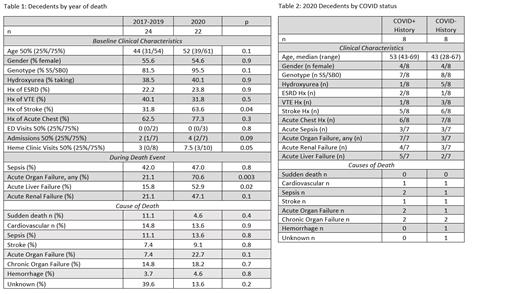Abstract
Background
The COVID pandemic resulted in excess all-cause mortality in 2020 in the United States, especially among people who identify as Black and/or Latino. While many of these deaths were due to COVID-19 infection, others have been attributed to strain on the overburdened health care system and delays in patients seeking medical care due to the pandemic. We sought to examine the overall mortality in individuals with sickle cell disease (SCD) who received their care at our Sickle Cell Center in Bronx New York in 2020 and investigated whether the number and causes of death in 2020 differed from the previous 3 years.
Methods:
Death date was collected from electronic medical records (EMR) and death certificates. Clinical variables collected from EMR included age, gender, race, genotype, history of comorbidities, hydroxyurea use, and health care utilization in the 12 months prior to death date. To determine cause of death, two hematologists performed manual review of the EMR blinded from each other and deaths were categorized as due to: sudden death, cardiovascular causes, sepsis, stroke, acute organ failure (including multi organ failure syndrome), chronic organ failure, hemorrhage, and unknown when records of the death event were not available. A third hematologist served as a tie breaker in cases of disagreement. Patients were also categorized as having: 1) sepsis present or absent during the death event, 2) acute (new or newly worsened) renal or liver failure present or absent during the death event, and 3) COVID status at death (acute COVID, past COVID, no COVID, or unknown COVID status). Acute COVID infection was defined by a positive PCR swab during the hospitalization leading to death or in the prior two weeks. Past COVID infection was defined by a negative PCR swab during the hospitalization and a positive PCR swab and/or antibody test more than two weeks before the death event with documented resolution of symptoms. No COVID infection was defined by a negative PCR swab or antibody test documented in the EMR and no positive tests present or noted per patient report. Unknown COVID status was unknown if no testing was present in the EMR. To examine how 2020 decedents differed from decedents in the prior 3 years, we compared clinical variables using the Kruskal Wallis test for continuous variables and chi 2 tests for dichotomous variables. To examine differences between 2020 decedents between known COVID (acute or chronic) vs. no COVID, we repeated similar tests among the 2020 decedents only.
Results:
In the years 2017, 2018, 2019, and 2020, there were 9, 10, 8, and 22 patient deaths respectively. Compared with decedents in the prior 3 years, patients who died in 2020 were more likely to have acute liver failure during the hospitalization, were more likely to have history of stroke, and had more heme clinic visits in the prior 12 months. Otherwise, there was no difference in age, gender, genotype, hydroxyurea use, history of disease morbidity, hospital utilization in the prior 12 months, or sepsis before death (Table 1). Among the 22 who died in 2020, 3 had an acute COVID infection, five had past COVID, 8 had no COVID, and 6 had unknown COVID status. Among 2020 decedents, acute or past covid was associated with acute organ failure (p=0.02) and less hydroxyurea use (p=0.04). (Table 2).
Conclusions:
SCD deaths at our center more than doubled in 2020 compared to prior years, but fewer than half of the decedents had acute or prior COVID. Compared with prior years, 2020 decedents were more likely to have acute organ failure. This could be explained by COVID infection, delays in seeking care, or changes in care delivery during the COVID pandemic. This study emphasizes the need for further studies on the impact the pandemic had on the health of adults with SCD, as well as the need for prospective studies of patients with SCD who recover from COVID.
Curtis: GBT: Consultancy. Minniti: Forma: Consultancy; GBT: Consultancy; Novartis: Consultancy; Novo Nordisk: Consultancy; Chiesi: Consultancy; F. Hoffmann-La Roche: Consultancy; Bluebird Bio: Other: Endpoint adjudicator; CSL Behring: Other: Endpoint adjudicator.


